Rabbi Dan Fink – Interfaith Sanctuary Board Member
Word on the Street Issue 49, November 2024
. . .
Today I had the deep privilege of working with my friend, classmate and colleague, Rabbi Arik Ascherman and his organization, Torat Tzedek (Torah of Justice), helping Palestinian farmers Mohammed and Fayek with their olive harvest in the West Bank village of El-Khader.
The lovely grove where we met them has been in their families for generations but the Jewish settlements of Neve Daniel and Elazar–part of the Gush Etzion bloc around Efrat– are encroaching on these Palestinian farmers’ land. Unfortunately, recent months have seen the development of an unofficial and unauthorized “law” that says Palestinians cannot be within 200 meters of any Jewish settlement. That means that the settlers’ expansions are denying Palestinians access to the justly-owned lands that are also their livelihood. This “law” is backed by armed settler security forces and, sometimes, the Israeli army as well, even though it is totally illegitimate and at odds with Supreme Court rulings.
So with all of this in mind, Torat Tzedek brings groups to work with these farmers, to make it harder to kick them off their own property. That’s what I was a part of today.
Rabbi Ascherman picked me up and drove me to the site, along with another volunteer, who has significant experience doing this work. On the ride, Arik shared his thoughts on the state of the nation. He noted that for decades he described himself as the “last optimist” but in today’s Israel, controlled by the most right-wing government in its history and stuck in two seemingly endless and deadly wars, he says he no longer remains optimistic. And yet. . . he persists, working tirelessly for justice for Palestine and Israel. Why? Because he stubbornly refuses to let go of his ideals, despite everything. He has been scorned and beaten by thuggish settlers and struggles to run a courageous human rights organization on a shoestring budget and staff–yet he holds fast to his moral vision. He is, in short, a hero, and it was an incredible honor to spend the day with him and his volunteers.
I worked with Mohammed, picking olives by hand. He is 78 years old–and stronger than most men half his age. He and Fayek were also incredibly gracious. They set us up with buckets and bags, groundcloth blankets and an old ladder, which is what remains for them after rogue settlers broke into and vandalized their tool shed. “Chaim kashim” they repeated several times in Hebrew–“life is hard”–yet they, too, persist, with dignity and kindness. They offered grapes from their vineyard, water from their well, and worked alongside of us on the site, which is beautiful and, save for the politics, tranquil. We shared stories, talked about our families, laughed together.
. . . Until we were interrupted by the IDF soldiers who showed up to enforce the bogus 200 meter rule and kick us all off the land. Thankfully, Arik and Mohammed handled the situation masterfully. In the presence of these armed soldiers, they were calm and peaceful and kind. And then Mohammed mentioned a friend who, it turns out, one of the soldiers also knew–and this shifted the conversation. To their credit, the soldiers changed their tone, which became friendly and familial, and they gave us permission to stay and work until 3pm. Arik noted that of course it doesn’t always–or even usually–go this way. The Occupation is not kind. But on occasion, the human beings tasked with enforcing it can be, and I was glad to witness this. It doesn’t remotely begin to make up for the cruelty, oppression and violence but it is a spark of light amidst the darkness.
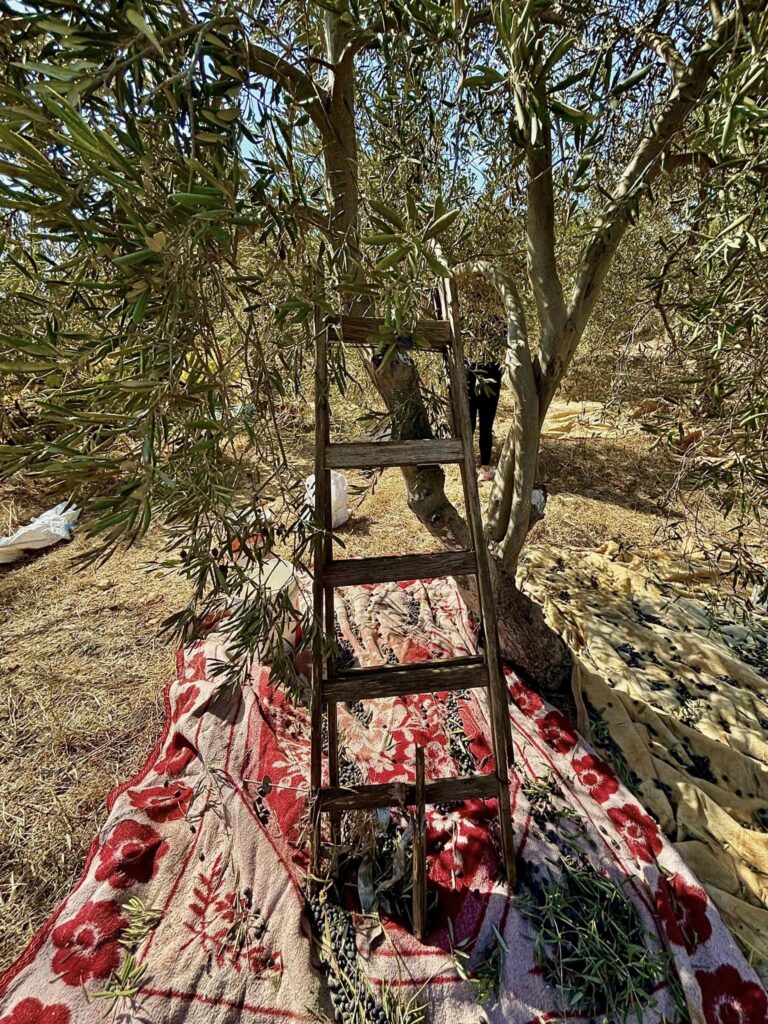
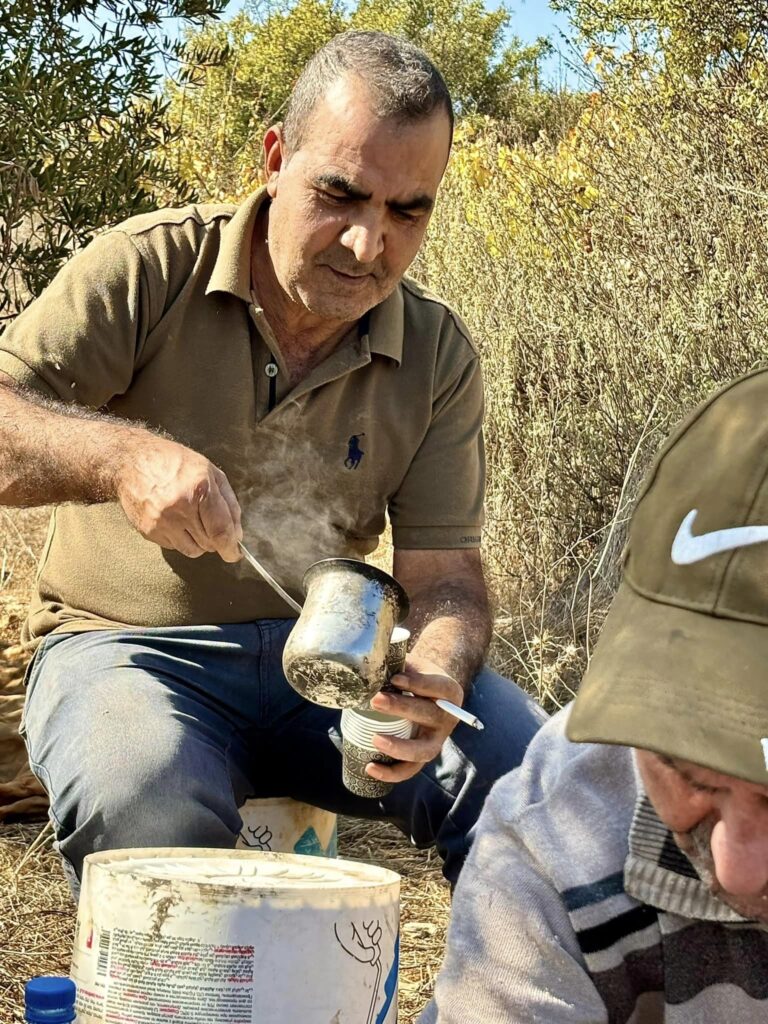
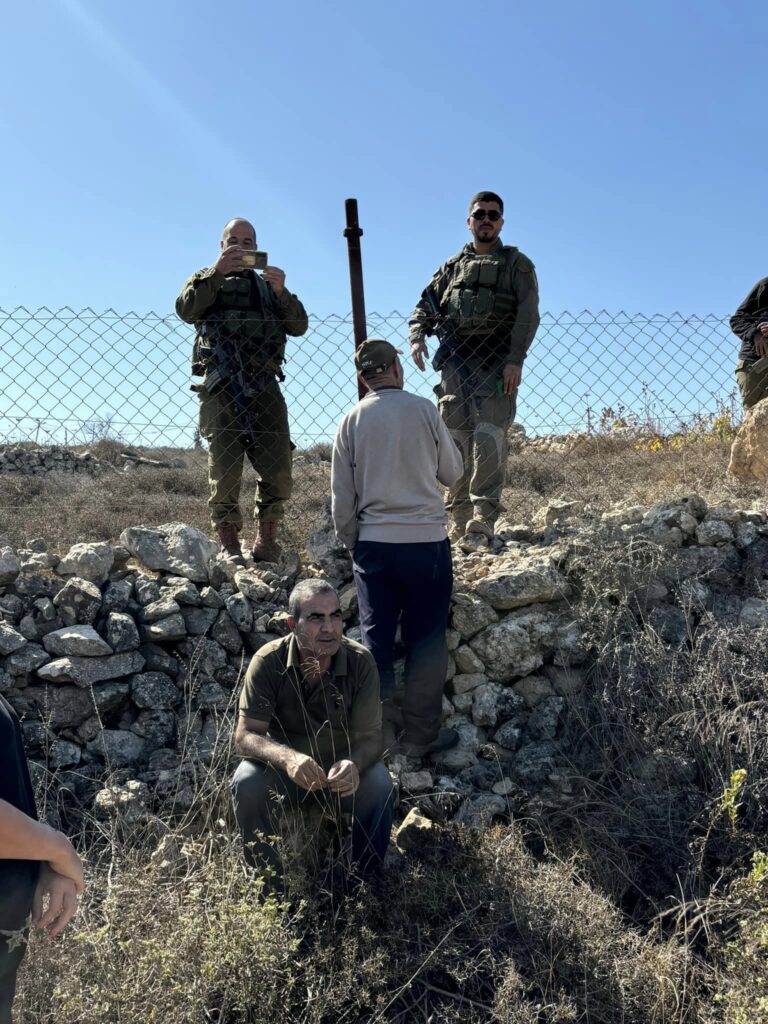
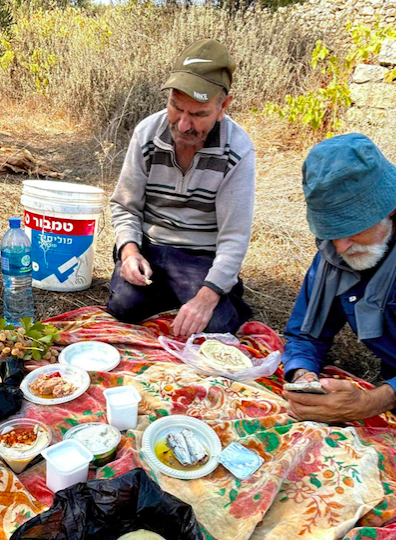
An hour or so later, Mohammed and Fayek served us a delicious Middle Eastern lunch, which we ate under the olive trees: pita, hummous, eggplant, fish, and Turkish coffee. We said blessings before we ate, in Hebrew and Arabic, thanking the Holy One/Allah for the shared repast.
After we finished eating, Rabbi Arik–who is a person of deep faith and Jewish learning–offered a kind of prayer/d’var Torah. He noted that in this week’s Torah portion, Noach, we read that when the Flood ends, Noah sends out a dove that ultimately returns with an olive branch, indicating that the waters have receded and peace has returned to the earth. Thus the classic symbol of the dove with the olive branch in its mouth–a harbinger of a better world. Eating beneath these trees, picking these olives together, we could all feel the power of that vision.
When Arik finished his d’var, Mohammed asked if he would also be willing to offer a blessing for the land and the harvest. He obliged, beautifully, with a prayer for peace, understanding, and bounty, in Hebrew and Arabic. To which we all offered a heartfelt “Amen!”
We went back to work and picked olives for another few hours, then cleaned up, hugged and shook hands and went on our way.
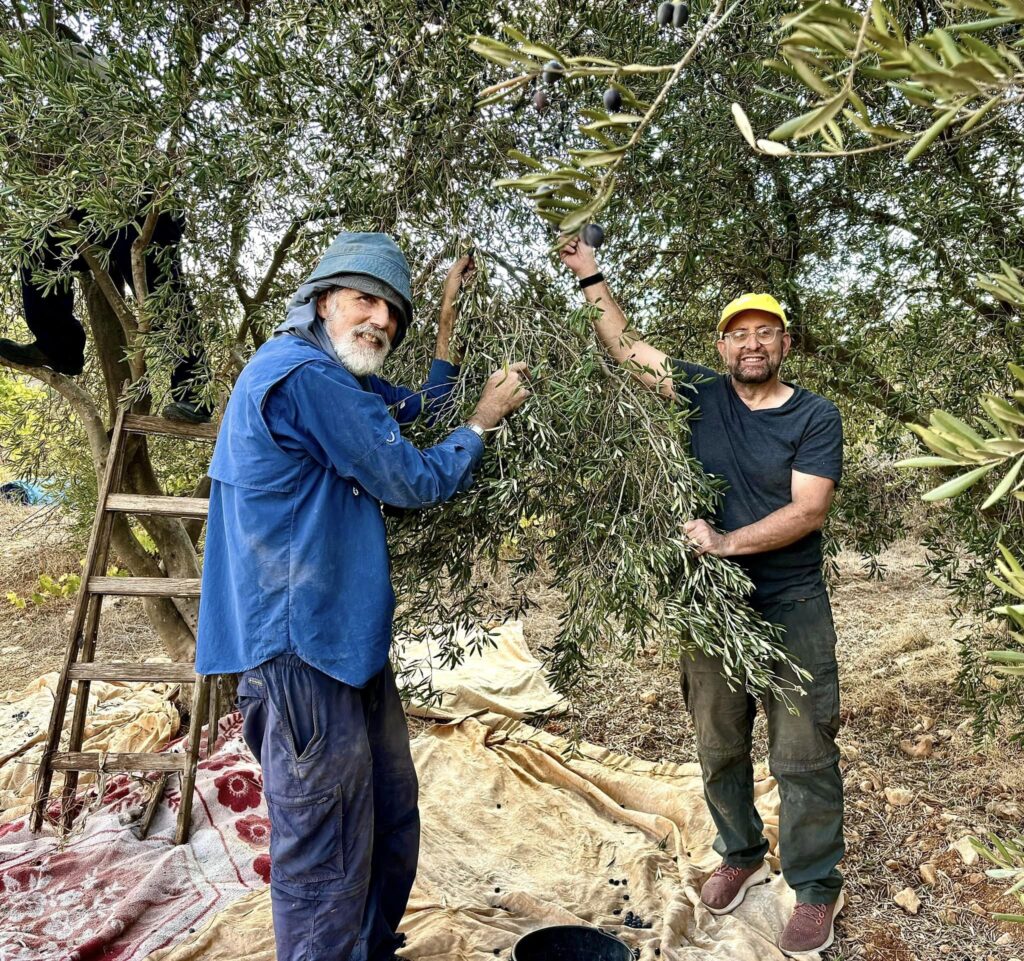
It’s not world peace, or the end of the Occupation. It won’t stop Hamas terror or convince Bibi Netanyahu and Itamar Ben Gvir to act like decent human beings. The war rages on, the missiles and drones continue to fly, the death toll, which includes so many thousands of Palestinian civilians, so many children, continues to rise. The vast majority of us have no real power to stop the massive suffering and loss–and those who actually possess that power don’t seem to give a d*** about anything except themselves.
But you have to start somewhere. Today I got a glimpse of how we might begin.
If you have read this and empathize with my words, please consider making a donation to Rabbi Ascherman’s organization, Torat Tzedek here: https://www.torat-tzedek.org/
Thanks!
